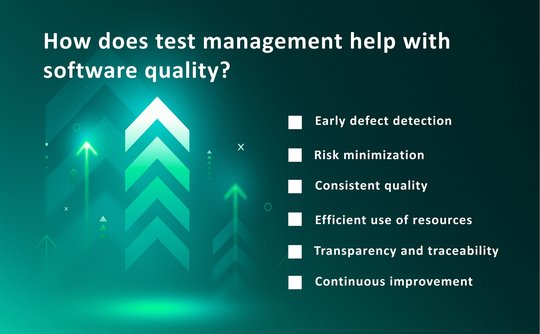What is test management and why is it important?
Test management encompasses the professional planning, control and management of software tests. It plays a decisive role in reducing development costs, shortening time-to-market and increasing customer satisfaction. Through structured test management by imbus, software tests are carried out efficiently and purposefully, ensuring the quality of the software and minimizing project risks.
How does test management help with software quality?
Test management is the invisible hero when it comes to software quality. Without good test management, small errors can go unnoticed and end up causing major problems. Effective test management ensures that all processes relating to software testing are coordinated and monitored so that there are no nasty surprises at the end. It helps to identify potential errors at an early stage and rectify them before they become expensive and time-consuming problems. Anyone who invests in test management is therefore investing directly in the quality of the software - and this always pays off in the long term.
Here are some specific ways in which test management contributes to improving software quality:
- Early defect detection: careful planning and execution of tests identifies and fixes defects and errors early in the development process before they can have a major impact.
- Risk minimization: A risk-oriented testing strategy ensures that the most critical areas of the software are tested intensively, reducing the risk of serious errors and failures.
- Consistent quality: The implementation of standardized test processes and methods in accordance with ISO 29119 ensures consistent and consistently high software quality.
- Efficient use of resources: Professional test management optimizes the use of test resources, saving time and costs and maximizing the efficiency of the test process.
- Transparency and traceability: Continuous monitoring and documentation of test progress enables clear traceability of test results and facilitates communication between all project participants.
- Continuous improvement: Through regular reviews and adjustments to the test processes as well as the introduction of automation techniques, the test process is continuously improved and adapted to the changing requirements of the project.
How the imbus test managers help you

imbus test managers offer comprehensive support for your software project:
- Planning the test activities: You develop and implement a risk-oriented test strategy that meets the specific requirements of your project.
- Managing the test team: By continuously monitoring and adapting the test activities, they ensure that the test plan is implemented effectively.
- Transparency and communication: imbus test managers provide all relevant stakeholders with up-to-date information on test progress and results, which facilitates decision-making.
- Improvement and automation: They identify optimization potential and support the implementation of automation measures to increase the efficiency and quality of test processes.
In addition to the services of our test managers, imbus also offers comprehensive coaching and training measures as well as a variety of other software testing services. These services can be used both on site and in the nearshoring model to support the successful implementation of your project.
Benefit from imbus' comprehensive know-how and take your software quality to the next level! Contact us quickly and easily by e-mail.
Book recommendation: Praxiswissen Softwaretest - Testmanagement
In this book, Praxiswissen Softwaretest Testmanagement, the fundamentals as well as tried and tested methods and techniques of test management are presented and explained using a consistent example. The authors show how test managers in large and small projects can successfully meet the daily tasks and challenges of test management.
Your contact person at imbus
Mr. Rolf Glunz
mail: softwaretest@imbus.de
phone: +49 9131 / 7518-0
fax: +49 9131 / 7518-50
![[Translate to English:] [Translate to English:]](/fileadmin/_processed_/f/8/csm_imbus.de_Softwaretest_Header_5af844c23c.jpg)

